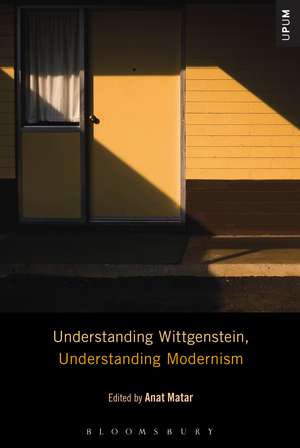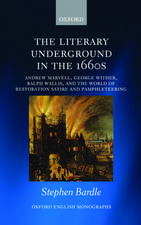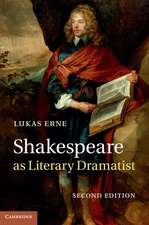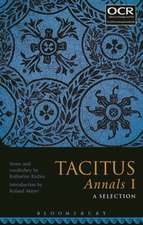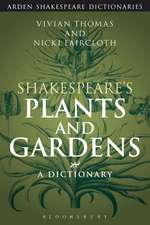Understanding Wittgenstein, Understanding Modernism: Understanding Philosophy, Understanding Modernism
Editat de Anat Mataren Limba Engleză Paperback – 25 iul 2018
| Toate formatele și edițiile | Preț | Express |
|---|---|---|
| Paperback (1) | 238.22 lei 6-8 săpt. | |
| Bloomsbury Publishing – 25 iul 2018 | 238.22 lei 6-8 săpt. | |
| Hardback (1) | 774.20 lei 6-8 săpt. | |
| Bloomsbury Publishing – 25 ian 2017 | 774.20 lei 6-8 săpt. |
Din seria Understanding Philosophy, Understanding Modernism
- 39%
 Preț: 498.72 lei
Preț: 498.72 lei - 23%
 Preț: 192.82 lei
Preț: 192.82 lei - 30%
 Preț: 570.60 lei
Preț: 570.60 lei - 22%
 Preț: 226.51 lei
Preț: 226.51 lei - 22%
 Preț: 259.79 lei
Preț: 259.79 lei - 13%
 Preț: 238.84 lei
Preț: 238.84 lei - 22%
 Preț: 239.21 lei
Preț: 239.21 lei - 13%
 Preț: 258.33 lei
Preț: 258.33 lei - 22%
 Preț: 238.01 lei
Preț: 238.01 lei - 22%
 Preț: 233.08 lei
Preț: 233.08 lei - 22%
 Preț: 226.51 lei
Preț: 226.51 lei - 22%
 Preț: 226.14 lei
Preț: 226.14 lei - 23%
 Preț: 198.93 lei
Preț: 198.93 lei - 23%
 Preț: 197.86 lei
Preț: 197.86 lei - 23%
 Preț: 194.33 lei
Preț: 194.33 lei - 23%
 Preț: 192.64 lei
Preț: 192.64 lei -
 Preț: 194.33 lei
Preț: 194.33 lei - 23%
 Preț: 191.75 lei
Preț: 191.75 lei - 30%
 Preț: 570.34 lei
Preț: 570.34 lei - 30%
 Preț: 539.73 lei
Preț: 539.73 lei
Preț: 238.22 lei
Preț vechi: 273.03 lei
-13% Nou
Puncte Express: 357
Preț estimativ în valută:
45.58€ • 49.67$ • 38.41£
45.58€ • 49.67$ • 38.41£
Carte tipărită la comandă
Livrare economică 23 aprilie-07 mai
Preluare comenzi: 021 569.72.76
Specificații
ISBN-13: 9781501343704
ISBN-10: 150134370X
Pagini: 288
Dimensiuni: 152 x 229 x 25 mm
Greutate: 0.39 kg
Ediția:NIPPOD
Editura: Bloomsbury Publishing
Colecția Bloomsbury Academic
Seria Understanding Philosophy, Understanding Modernism
Locul publicării:New York, United States
ISBN-10: 150134370X
Pagini: 288
Dimensiuni: 152 x 229 x 25 mm
Greutate: 0.39 kg
Ediția:NIPPOD
Editura: Bloomsbury Publishing
Colecția Bloomsbury Academic
Seria Understanding Philosophy, Understanding Modernism
Locul publicării:New York, United States
Caracteristici
Comprehensive exploration of Wittgenstein's influence on the literature and study of modernism
Notă biografică
Anat Matar is Senior Lecturer of Philosophy at Tel Aviv University, Israel. She is the author of From Dummett's Philosophical Perspective (1997) and Modernism and the Language of Philosophy (2006), and co-editor (with Anat Biletzki) of The Story of Analytic Philosophy: Plot and Heroes (1998) and (with Abeer Baker) of Threat: Palestinian Political Prisoners in Israel (2011).
Cuprins
List of ContributorsAbbreviationsSeries PrefaceIntroduction: Giving the Viewer an Idea of the LandscapeAnat Matar (Tel Aviv University, Israel)Part I - Conceptualizing Wittgenstein1. Language, Expressibility and the Mystical John Skorupski (University of St. Andrews, UK)2. Modernism and Philosophical Language: Phenomenology, Wittgenstein and the EverydayOskari Kuusela (University of East-Anglia, UK)3. Wittgenstein and 'Ordinary Language Philosophy'Hans-Johann Glock (University of Zurich, Switzerland) and Javier Kalhat (University of Zurich, Switzerland)4. Wittgenstein's Modernist Political PhilosophyThomas Wallgren (University of Helsinki, Finland)5. Too Cavellian a Wittgenstein: Wittgenstein's Certainty, Cavell's ScepticismDanièle Moyal-Sharrock (University of Hertfordshire, UK)Part II - Wittgenstein and Aesthetics6. Wittgenstein, Musil and the Austrian ModernismPierre Fasula (Paris 1 Panthéon-Sorbonne, France)7. 'We should be Seeing Life Itself': Back to the Rough Ground of the StageÉlise Marrou (Paris Sorbonne University, France)8. A Confluence of Modernisms: Wittgenstein's Philosophical Investigation and Henry James's Literary LanguageGarry L. Hagberg (Bard College, USA)9. Modernism with Spirit: Wittgenstein and the Sense of the WholeAntonia Soulez (University Paris-8 St. Denis, France)10. Wittgenstein and the Art of DefamiliarizationDavid Schalkwyk (Queen Mary, University of London, UK)Part III - GlossaryLogicSebastian Sunday Grève (Queen's College, University of Oxford, UK)PictureStefan Brandt (University of Erlangen-Nürnberg, Gremany)GrammarPhil Hutchinson (Manchester Metropolitan University, UK) and Rupert Read (University of East Anglia, UK)UseHarvey Cormier (State University of New York at Stony Brook, USA)Psychological ConceptsYuval Lurie (Ben-Gurion University, Israel)EthicsBen Ware (University of London and Kingston University, UK)ArtDavid Macarthur (University of Sydney, Australia)Index
Recenzii
This original, high-caliber collection explores the grammar of twentieth century 'modernism' from James to Schoenberg to Greenberg, using Wittgenstein as a lens. The themes are timely and deep: radical self-criticism as method; inevitable tensions facing phenomenological attentiveness to form in logic, psychology, and the 'ordinary'; philosophy's relation to literature, poetry, theatre and music; mysticism, pessimism, and certainty.
Analytic purists, with whom he has been associated, will be sceptical about drawing connections between Wittgenstein's philosophy - and 20th century philosophy in general - and the artistic modernism of his time. From diverse perspectives informed both by philosophy and the arts, contributors to this volume refute that scepticism. They elucidate the tantalising relationships that arise from Wittgenstein's radical self-criticism, his concern with language and the arts, and the intensified development of the Enlightenment project that modernism represents.
Analytic purists, with whom he has been associated, will be sceptical about drawing connections between Wittgenstein's philosophy - and 20th century philosophy in general - and the artistic modernism of his time. From diverse perspectives informed both by philosophy and the arts, contributors to this volume refute that scepticism. They elucidate the tantalising relationships that arise from Wittgenstein's radical self-criticism, his concern with language and the arts, and the intensified development of the Enlightenment project that modernism represents.
